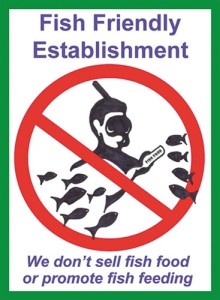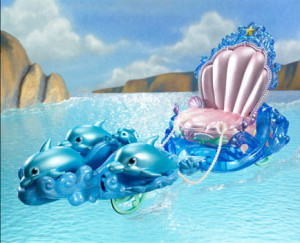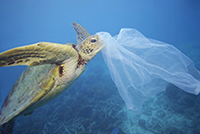At Blue Water Divers we realize that our actions, as well as our inaction, can have a critical impact on the environment around us and the health of the marine ecosystem. A healthy marine ecosystem is essential to our business and we believe it is important to be eco-friendly. But it’s not just about our business. Scientists believe that at least 50% (some believe the number is closer to 85%) of the Earth’s oxygen comes from our oceans, so the continued health of the oceans is, in fact, essential to all life on earth. Oceans cover more than 70% of the planet and provide countless other benefits to humans including jobs, food, medicines, climate regulation and recreational opportunities. Therefore, environmental responsibility is an issue with relevance to everyone on the planet.
We try to increase environmental awareness through our daily actions, including:
We employ an environmental responsibility policy for both our staff and our guests. We do not engage in or allow feeding/scenting/touching/petting/picking up/harassing marine life in any way, including fish/coral/rays/sharks/invertebrates/etc…
On this page we talk about a few of the most common practices that we do not participate in, or allow. Please take a moment to read about WHY we feel so strongly and we truly believe you will start to share some of the same opinions.
If you agree, please talk to any other water sports operators you may come across in the future about why they should also take responsibility for the ecosystem. Especially if this ecosystem is what enables them to make a living! When and if you do have such a conversation, please do it in a respectful manner. We have found that lots of people are simply not informed when it comes to these issues, and are willing to make some changes when they find out the damage they are doing. If providing information in an attempt to educate others doesn’t seem to yield positive results, vote with your wallet!
We ask you to understand and respect where we are coming from with our Environmental Responsibility Policy and that you not breach our policies for the duration of your time with us. Please understand that we will not compromise on this policy. At the end of the day we would love your business, but we feel environmental responsibility is of greater importance than earning a quick buck.
 Sometimes people are surprised to find out that we don’t support feeding/scenting the fish. First let’s talk about the difference between fish feeding and fish scenting.
Sometimes people are surprised to find out that we don’t support feeding/scenting the fish. First let’s talk about the difference between fish feeding and fish scenting.
Fish feeding is pretty self-explanatory. It is when you put something into the water to attract the fish, whether that is bread crumbs, part of a banana, cheez whiz, fish chum, artificial fish food, or bubble gum (yep, we’ve even seen people want to throw in bubble gum for the fish!).
Fish scenting is when you put something, usually fish chum, into a container that allows scent to get out, but doesn’t allow the fish to actually eat the substance. The most common method of fish scenting is putting fish chum into an empty water bottle that has a hole punched in the lid. When you squeeze the bottle, the scent comes out into the water and attracts the fish. Fish scenting is becoming more popular because it doesn’t yet have the negative connotation that fish feeding does.
So why don’t we support fish feeding or fish scenting to “attract” fish? It is illegal in the TCI to feed the fish. However, even if it was legal, we still wouldn’t support this practice for a number of reasons.
Fish live in a very delicate ecosystem, where reef maintenance is crucial. There is a very special relationship between the reef, the algae, and the fish. Too much or too little of any one thing and it’s bad for all of them. Any time a fish is eating food provided by a person, it means it is NOT eating what it is “supposed” to be eating. The results of this depend on what the target fish’s typical diet is. If the fish normally feeds on the algae in the reef, the algae will start to overgrow and can eventually kill the reef. If the fish normally eats other smaller fish, but starts eating human food instead, then the amount of smaller fish who eat algae will increase and too much algae will be consumed, resulting again in the eventual death of the reef. These changes to the environment don’t take place overnight, but they do take place and can have serious consequences.
Fish feeding has also been shown to change fish behaviour in several ways, including causing fish to become more aggressive, even when food is not present. Yep, you read that right, the fish start to associate the presence of people with food, and will show their new aggressive behaviour any time they encounter a human (even one without food). Reports of fish biting are almost unheard of in places where no fish feeding happens, but are fairly common where fish are fed – even amongst fish that are typically completely non-aggressive.
Scenting is a little different from feeding, and is now a more common practice. Because the fish are not able to actually eat anything, there isn’t as much of a direct impact (that we know of yet) on the reef. Having said that, it still causes fish to become more aggressive as they start to associate humans with food. Fish that have been consistently exposed to scenting tend to bite people’s hands (as they think there is going to be food there).
Fish feeding and fish scenting has not been a big issue on Grand Turk until recently. With the arrival of the cruise ships many of the people offering snorkelling tours, including all in water excursions through the ship, actively feed and/or scent. Since this development, there has been a dramatic increase in the aggressiveness of some of the fish. This has culminated in the last year with some fish starting to actually bite divers, even ones who aren’t participating in feeding or scenting, which is a behaviour that never occurred in the past.
At Blue Water Divers, we understand that the very survival of our planet depends upon the health of the Earth’s oceans. We promise we will never feed or scent the fish.
Most people wouldn’t dream of swimming down to a shark, grabbing it, and swimming back to the surface with it. But that is exactly what some tour guides do in the hopes of getting better tips! They do this to give their customers an opportunity to “pet” a shark. They generally feed the shark while this is happening to help keep it from trying to leave while they are holding it. Do we really need to explain why this is potentially dangerous?
In Grand Turk there is a specific spot that tour operators go to in order to bait and then handle the sharks. Although typically docile, the sharks in this area have started showing aggressive behaviour. They have learned to associate humans with food. To date, nurse sharks have been the primary focus of these tours, but interfering with sharks is never a good thing!
The stingrays are another story. Stingray City in Grand Cayman has taught us many valuable lessons about the damage humans have caused to the stingray population and their natural behaviours, as well as the damage these activities have caused to some humans! Despite the fact that we have lots of evidence as to why you shouldn’t feed stingrays, people still regularly express interest in this type of activity.
Because people are interested in this activity, they are willing to pay money for it (illegal or not). Therefore, there are tour guides who are happy to oblige, regardless of the consequences. In fact, some tour guides aren’t content with just providing food to attract stingrays, but prefer to add in an extra step of harassment by lifting the stingrays out of the water to “hug” their customers (as this usually guarantees a bigger tip). It is important to note here that stingrays can not breathe when they are not in the water, so this is equivalent to someone taking an animal that lives on land and holding its head underwater to get a “fun” picture. In many countries lifting a stingray from the water is illegal because it is so extremely stressful for the animal (would you like to have your head held underwater for the entertainment of visitors to your home?!).
At Blue Water Divers, we promise we will not feed the sharks or the stingrays. We promise we will never harass or handle these animals, and that we will never lift them out of the water where they can’t breathe.
 Lets be honest… all of us have had dreams about being pulled through the sea on our underwater dolphin-drawn sea chariot. No? Just me? The point is that we understand the attraction of “riding” a dolphin or a turtle, but we also know that it is wrong.
Lets be honest… all of us have had dreams about being pulled through the sea on our underwater dolphin-drawn sea chariot. No? Just me? The point is that we understand the attraction of “riding” a dolphin or a turtle, but we also know that it is wrong.
Marine turtles have existed for over 180 million years and sharks for over 409 million years! While dolphins have only been around for around 10 million years, they have still been here a lot longer than we humans have! Turtles, sharks and dolphins all play a substantial role in marine ecosystems. All species of marine turtles are classified as either threatened or endangered, and many marine mammals and shark species are classified as depleted, endangered, or threatened.
On top of all that, these animals don’t enjoy being chased, held or restrained (would you?) and in many countries it is illegal to harass wild turtles and marine mammals such as dolphins. For example, violating the U.S. Marine Mammal Protection Act (MMPA) can lead to a $20,000 fine and a year in jail, while violating the U.S. Endangered Species Act (ESA) can lead to a $50,000 fine and a year in jail.
You may be wondering; what is so bad about it? Imagine for a moment that you are in a swimming pool, and you hold your breath to dive down to the bottom. Now lets say that someone put their hand on you head and lightly holds you down. This will probably stress you out, even if you still have plenty of breath left. The same applies to the marine animals which must return to the surface to breathe. And what if a natural predator approaches this animal when it is already low on breath (just because some silly human wanted to “play” with it or chase it)?
When people handle these majestic animals, it stresses them, and they are much less likely to allow a person to get close to them again. If you have ever been in the water close to a turtle or a dolphin, you know what a cool experience it is. Why would you take that away from someone else? Why would you do something that prevents other people from enjoying the same magical moment you had? And if you are there to enjoy the animal’s presence, why would you do something to harass it (it may be helpful to imagine yourself in the animal’s position)?
At Blue Water Divers, we promise we will never touch, ride, or harass any marine life. We respect the ocean and its inhabitants, and we realize that we are only visitors to their home.
You would think that, in this day and age, people would realize that they shouldn’t throw their garbage on the ground. Well, it is still a big problem and when you are on an island (especially a small one like Grand Turk!), things that get thrown on the ground have a pretty good chance of ending up in the sea and causing significant damage.
 Plastic bags are one of the biggest culprits (actually it is not the bags themselves who are the culprits, but the people who handle them irresponsibly!). In water, plastic bags can appear similar to jellyfish, which many turtle species feed on. This causes blockages in their digestive system which can lead to their death. This is why throwing plastic into the ocean is illegal in the U.S. Even small amounts can be harmful to marine mammals if entangled or ingested.
Plastic bags are one of the biggest culprits (actually it is not the bags themselves who are the culprits, but the people who handle them irresponsibly!). In water, plastic bags can appear similar to jellyfish, which many turtle species feed on. This causes blockages in their digestive system which can lead to their death. This is why throwing plastic into the ocean is illegal in the U.S. Even small amounts can be harmful to marine mammals if entangled or ingested.
In addition, most litter which goes into the sea will eventually break down into very tiny pieces. When these pieces are then consumed by a vast array of smaller marine life, this also can lead to their death. In addition, litter releases toxins into the water as it breaks down.
If plastic litter is not eaten early on, it will continue to break down until it becomes something scientist call “microplastic,” which is exactly what it sounds like – microscopic pieces of plastic. Mussels and other shellfish that filter the water consume these microplastics. This is currently being researched, but many people believe that the toxins that are released by these microplastics into the mussels will eventually make their way back to the human population when we eat the mussels and other contaminated shellfish. We are poisoning ourselves.
At Blue Water Divers, we promise to not litter. We also promise to actively fight this problem by continuing to organize litter and beach cleanups as well as provide education about the critical importance of reducing litter.